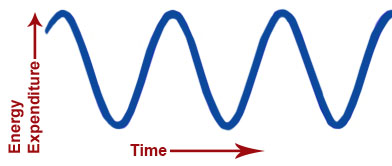This time management approach acknowledges the oscillating principal of human energy. Human energy cannot be expended continuously without periods of rest. Both knowledge workers and physical workers, like athletes and musicians, are capable of incredible feats of mental and physical exertion. However, athletes understand one aspect of energy management better than business people: Periods of intense energy exertion must be followed by periods of rest. Athletes know they can’t stress their muscles (think pumping iron) for an indefinite period. They know muscles are strengthened by intervals of extreme stress followed by intervals of rest and regeneration. The same can be said about intellectual work. In order to achieve peak productivity, periods of rest and relaxation must follow periods of intense mental activity. I depict the healthy oscillation of energy expenditure and rest like this: This stress wave shows that periods of intense energetic outlays are followed by equal periods of reduced exertion, or rest. The Pomodoro Technique makes use of the oscillating principle of human energy. The Pomodoro Technique is named after a tomato-shaped kitchen timer (pomodoro is Italian for tomato), used by the founder of the technique, Francesco Cirillo, to measure periods of intense activity followed by short breaks. It is a great way to:
In a Pomodoro (a 25-minute burst of work), you commit to focus on the task at hand without interruptions or distractions. Allowing interruptions or anything that distracts your focus from the task at hand can increase the time to complete by 25%, according to Tony Schwartz and Catherine McCarthy in a Harvard Business Review classic entitled Manage your Energy, not your Time. When you divert your attention away from your original task to something else, it’s called “switching time” and that’s time you lose when you try to multi-task. In fact, Professor Gloria Mark of University of California at Irvine found in her research that when you are interrupted, it takes an average of 23 minutes to get back to the original task. In addition to curing bad bouts of procrastination, the Pomodoro technique is helpful for people who have a tendency to over-polish their projects or those who push for perfection when good is enough. For these people (you know who you are), you can either self-assign or ask your manager to assign a limited number of Pomodoros to spend on a project. As a manager, you might allow your favorite perfectionist four Pomodoros to complete the PowerPoint deck for the Quarterly Business Review. After that, ask the perfectionist to present the project to you for further direction or approval. At that point, you can coach your employee on what quality of work will suffice and assuage their fear of not being good enough – or wrest the project out of their hands so they can’t work anymore on it! In a nutshell, this is the Pomodoro Technique:
The benefits I have discovered about the Pomodoro Technique are:
Try the Pomodoro Technique and post a comment on this post to let us know how it went! Kristin Robertson, CEO of Brio Leadership, is dedicated to increasing the number of employees who are excited to go to work on Monday mornings. Services include executive coaching, leadership development classes and company culture consulting. Don’t forget to get a copy of Kristin Robertson’s new book, Your Company Culture Ecosystem, available on Amazon.
5 Comments
Whitney Martin
10/12/2015 10:16:22 am
While I have a self-developed method, this one is better defined and has easy to follow guidelines. Thank you for sharing something you have already tested out for your readers. I plan to test it out right away!
Reply
Robert Schaefer
10/26/2015 11:37:47 am
Fantastic technique Kristin! I am very grateful for you sharing it.
Reply
10/26/2015 12:18:59 pm
Yes, we all need more techniques to try when our tried-and-true ones no longer work! Glad you enjoyed this one.
Reply
David Fisher
1/5/2016 10:45:29 am
I used this technique yesterday on a weekly report that I put together each Monday. It has been taking me well into the afternoon, sometimes until the end of the day to complete with all the ongoing distractions of a typical hectic Monday. But when I used this technique, I had wrapped it up in 3 pomodoros with no ill effects to my regularly scheduled duties.
Reply
Leave a Reply. |
From the desk of
|
Our services |
Our Company |



 RSS Feed
RSS Feed

